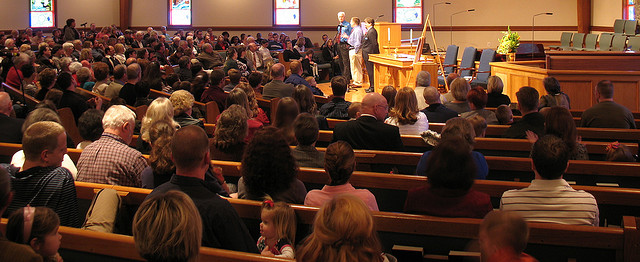This is the fourth article in a series. See Part 3.
The one great preacher in history, I would contend, is the church. And the first business of the individual preacher is to enable the church to preach. P.T. Forsyth1
Former students will sometimes tell me how they have adapted their homiletical strategies to fit their congregational contexts. However, almost invariably, when they tell me this, it comes with an apology: “You’re not going to like this, but I’m not using the lectionary … ”
Instinct tells me this statement is not primarily rooted in real or imagined deficiencies within the lectionary or any other homiletical strategy. Instead, it’s the sense that students got in seminary, namely, that the purposes of preaching (its rules, its norms) were fixed and universal rather than being collaborative and provisional.
In short, they feel as if they are betraying their theological education rather than retooling it within a congregational context.
In the spirit of reintroducing the elasticity and diversity inherent in the preaching life, what follows are some actual examples of sermonic purpose from the classroom and parish settings and, with these, some questions that work as an invitation to do so more and more.
Recent graduates report that their pastoral charges are not only insufficiently formed in the Christian story, but also colonized by other and perhaps hostile narratives.
In response, they have adopted a modified form of lectio continua (reading the Bible from cover to cover). But notice, many use a “modified” version of lectio continua. I suspect they also choose texts to “lavish” the congregational imagination with the great story of salvation history.
Articulated as a purpose this approach might appear thus: “The purpose of preaching is to rehearse, remember, and anticipate the scriptural story of God’s salvation story for the church.”
Often, we come to our purposes from the ground up, in a sense discovering and revising the “why” in the process of articulation. For example, one of my students reports a sense of satisfaction when members want to talk further about the scripture and sermon afterwards. Flourishing in this context may mean curiosity, a safe space for thinking out loud, for ambiguity.
Maybe this has to do with a congregational struggle to reconcile belief and trust in a climate of cynicism and doubt. People of faith grow through the questions they ask as much as they do through the faith they hold: “The purpose of preaching is to cultivate a learning environment after the pattern of Christ’s own life, our questions activated and illuminated by the activity of the Spirit.”
Another student speaks of preaching as not only speaking to the marginalized but also from their experiences and, as an advocate, for their wholeness. This purpose would reflect a deliberately hermeneutical approach, doing theology from below: “The purpose of preaching is to testify (from a particular socio-cultural experience) to God’s liberative, healing, and loving shalom.”
I cite these as positive examples but I also see them as invitations to more deliberately collaborative approaches. Consider using or adapting the following questions to begin the conversation:
- What kinds of flourishing do I look for as a response to the proclaimed Word? How are these similar or different from the hopes of the congregation?
- How do theological commitments and human experiences inform our idea of what flourishing looks like?
- After pew and pulpit are emptied, how does the sermon preached on Sunday enable the congregation to become a preacher on Monday?
- Where does the church report experiences of salt, yeast, and light of God’s presence in the sermonic moment and beyond?
Some caveats to keep in mind: a purpose is not the same as a systematic explanation for preaching. “Preaching,” writes Jana Childers, “is meant to do something.”2 Just so, as yeast leavens, salt preserves, and light illumines, our purposes reflect something of God’s saving acts.
Additionally, every purpose has its blind spots and this is okay: congregations live in the messy place between proclaiming God’s Word — which endures forever — and speaking for such a time as this ( … and times they are a changin’!).
Relatedly, you might develop a purpose for a particular season in the church’s life — e.g. institutional, pastoral, or liturgical — rather than one that will account for all preaching until Jesus returns.
And finally, our purposes need not be mutually exclusive — in fact, if they reflect even a small portion of the mystery of God’s self-disclosure, their interactions will compliment rather than compete with each other.
Notes:
1 P.T. Forsyth, Positive Preaching and the Modern Mind (New York: A. C. Armstrong, 1907) in Richard Lischer, ed., The Company of Preachers: Wisdom on Preaching (Grand Rapids: William B. Eerdmans Publishing Company, 2002), 412.
2 Childers, “Seeing Jesus” in Childers, ed., Purposes, 47.

